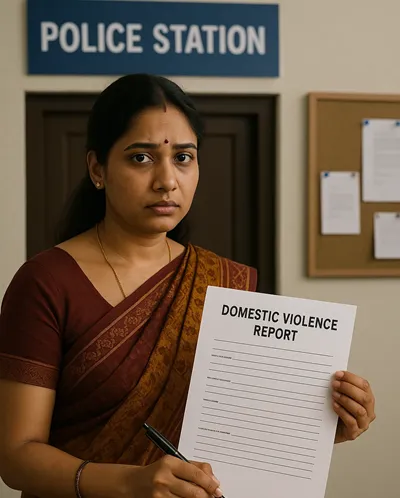Domestic Violence Complaint Process – Your Rights & Steps

The Protection of Women from Domestic Violence Act, 2005 (PWDVA), along with relevant criminal penalties under the Bharatiya Nyaya Sanhita, 2023 (BNS), protects women from abuse by husbands or in-laws.
1. Recognize the Abuse
Domestic violence can be:
- Physical: hitting, pushing, assault
- Verbal / Emotional: insults, threats, humiliation
- Sexual: forced sexual acts, harassment
- Economic / Financial: denial of money, control over income
- Psychological: intimidation, grief, controlling behaviour
2. Reach Out to Authorities / Support
You may approach:
- The local police station
- The Protection Officer designated under the Act
- The Magistrate's Court directly
- NGOs, women's helplines, shelters, or legal aid organizations
3. Prepare Your Complaint
Write or orally state:
- Your name, address, and details
- The accused's details
- Nature of abuse, dates, events
- Supporting evidence if available — medical reports, photos, messages, witnesses
4. Filing the Complaint
- Submit it in writing to the police/protection officer/magistrate.
- If told orally, ask them to write it and read it back to you before you sign
- Ask for a Domestic Incident Report (DIR) from the Protection Officer, which is forwarded to the Magistrate and police under PWDVA Rules (e.g., Tripura rules) socialwelfare.tripura.gov.in
5. Role of the Protection Officer
They assist you by:
- Preparing the DIR and forwarding to Magistrate, police, and service providers socialwelfare.tripura.gov.in
- Arranging medical aid, shelter, counseling
- Helping you file applications for relief under the Act
6. Magistrate's Orders/Reliefs
The Magistrate may issue:
- Protection Orders (to restrain further abuse)
- Residence Orders (the right to stay in the shared household)
- Monetary Relief/Maintenance
- Custody Orders (for children)
- Compensation
- Interim/Ex parte orders if immediate relief needed (without waiting for full hearing)
The court must act in camera (private) and provide orders free of cost under PWDVA Chapter IV – Procedure NCW
7. Criminal Proceedings If Needed
If there is serious assault, sexual abuse, or cruelty that is also a crime under BNS/IPC, you may also file an FIR under appropriate provisions alongside or after the DV complaint.
Example Rule References Table
| State / Rule Set | Key Rule / Form / Procedure | Notes / Link |
|---|---|---|
| Tripura | PWDVA Rules, Rule 4–6: Domestic Incident Report (Form I), application to Magistrate in Form II, affidavits in Form III | The official state rule book permits the protection officer to file a complaint and assist with ex parte affidavits. socialwelfare.tripura.gov.in |
| All India / Central | The PWDVA Act – Chapter IV lays down procedure for orders, service, notice, etc. | The central Act is applicable across India; state rules supplement it NCW |
FAQs – Domestic Violence Complaints
-
What counts as domestic violence under law?
-
Physical, sexual, verbal, emotional, or economic abuse by spouse, partner, or in-laws.
-
Who can file the complaint?
-
Any woman in a domestic relationship — wife, mother, sister, widow, or live-in partner.
-
Can a man file under this act?
-
No — this act is specific to women. But men can seek protection under other laws.
-
Where do I file it?
-
Local police station / Protection Officer / Magistrate's Court / NGO or helpline help.
-
Do I need a lawyer?
-
Not mandatory; you can file yourself or with help from PO/NGOs.
-
What evidence helps?
-
Medical reports, photos, messages, audio/video, witnesses. Lack of proof doesn't bar filing.
-
Can I get immediate protection?
-
Yes — you can request an interim protection order that applies until the full hearing.
-
What orders can a court give?
-
Protection order, residence order, maintenance, custody, compensation.
-
Do I have to leave the shared home?
-
No; you have a legal right to stay in the shared household while the case proceeds.
-
Is there a fee to file a DV complaint?
-
No — DV cases are exempt from court fees under the Act.
-
How fast must the court act?
-
The magistrate must hear within 3 days and ideally pass orders within 60 days under the act's procedure framework.
-
Can I file a criminal case too?
-
Yes, for crimes like assault, cruelty, etc., under BNS / IPC.
-
What does the protection officer do?
-
File and forward the DIR, help prepare and file applications, coordinate with police, help you with shelter, and provide legal aid.
-
Can I file while hiding my identity?
-
Some initial help can be sought, but your basic identity is needed for legal orders.
-
What if orders are disobeyed?
-
The person can face arrest, jail, or a fine for violating court protection or residence orders.
-
Is mediation allowed?
-
Yes, but only if the woman consents and her safety is assured.
-
Can I withdraw my complaint?
-
Yes, but the court will check if the withdrawal is voluntary, without pressure.
-
Does DV law cover live-in relationships?
-
Yes — in many cases, if the relationship is marriage-like and certain conditions are met.
-
Can I file DV after divorce?
-
Yes, for violence that occurred during your domestic relationship prior to divorce.
-
What if I physically can't go to the police?
-
Use national helplines like Women Helpline 1091/181, contact an NGO or have a protection officer file on your behalf.
Add new comment